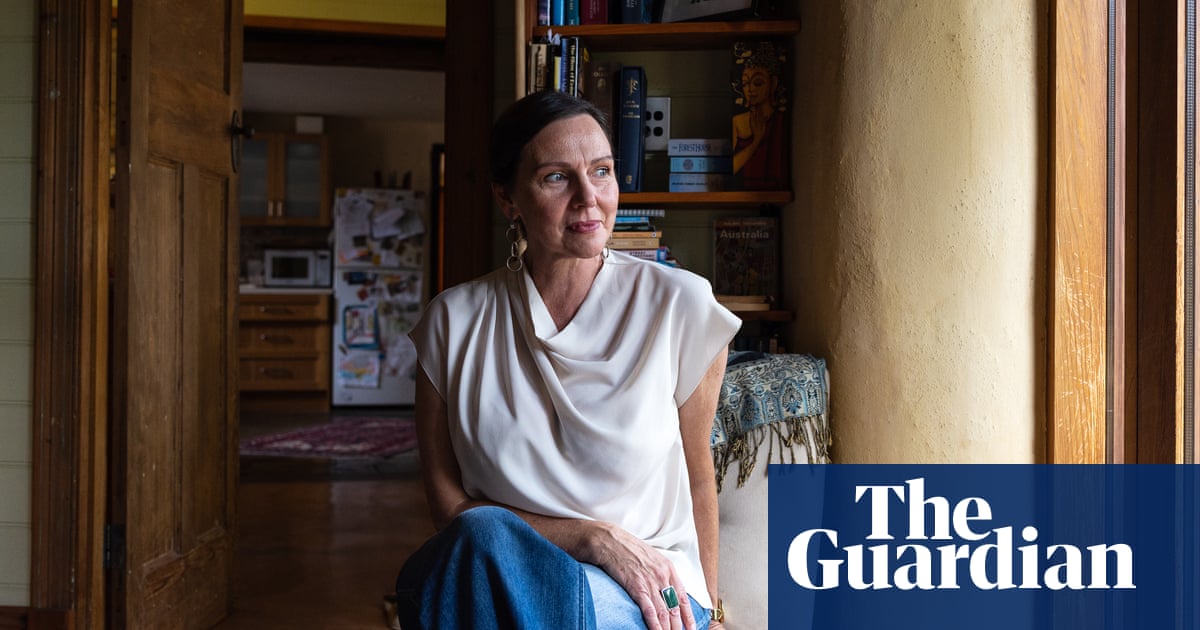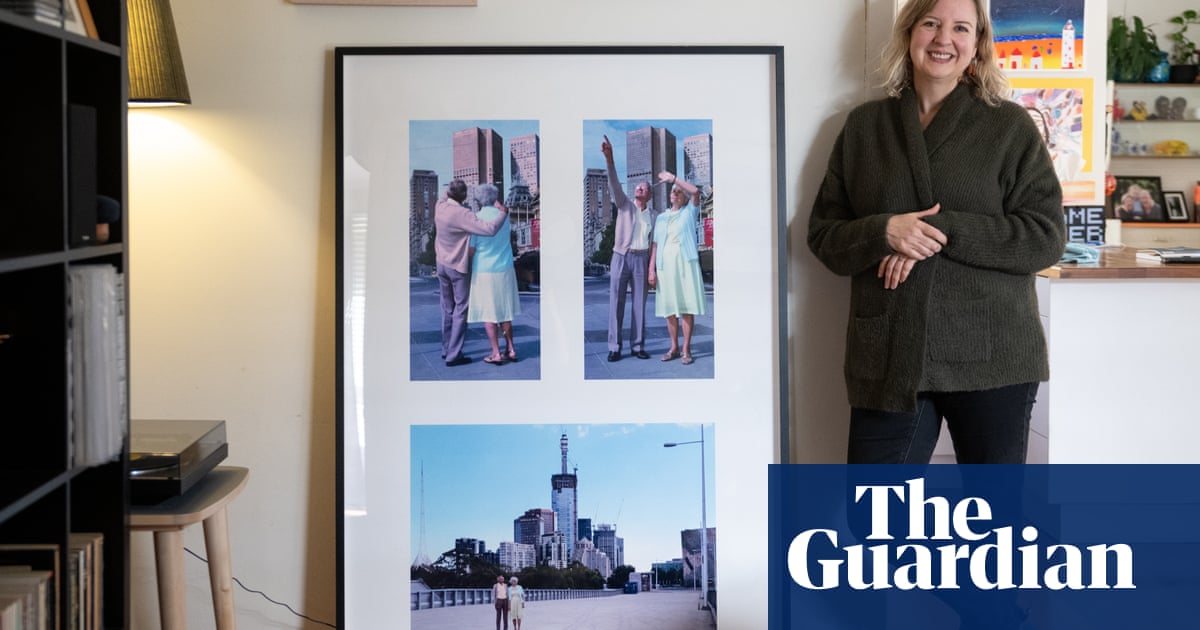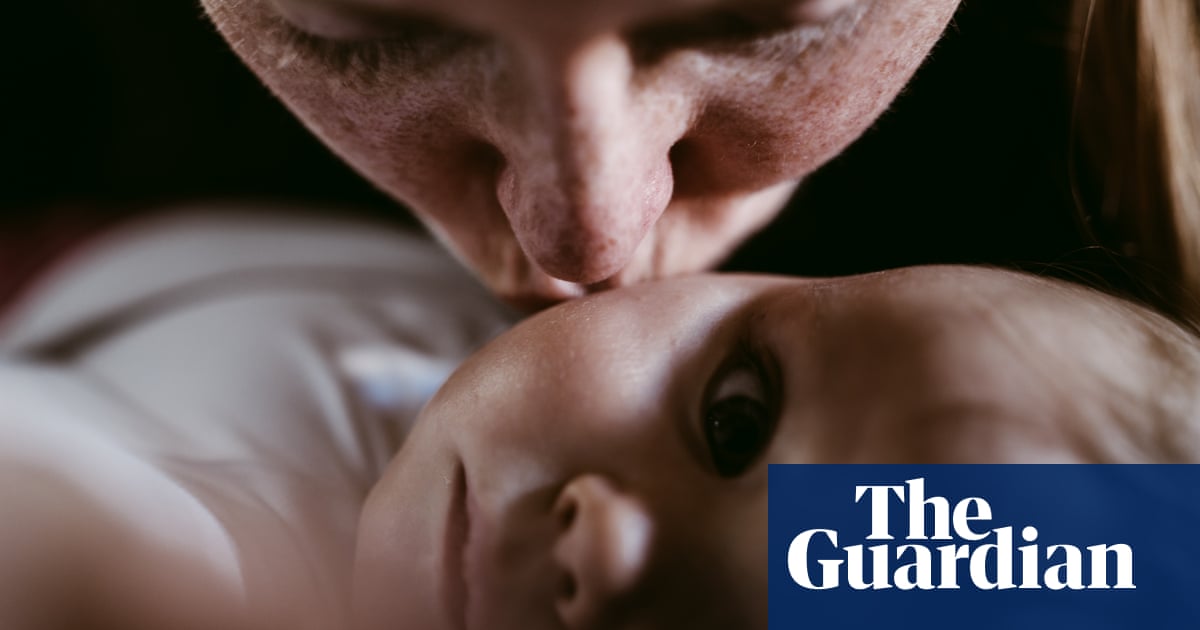
Kate Baer wrote her first book of poetry, What Kind of Woman, from a booth at a chain café in the Philadelphia suburbs. She couldn’t work at home – that’s where the children were. “We were living in this 1,200sq ft place in town,” she says, over Zoom. “With four kids.” It was the beginning of 2019. Baer was writing in pockets of time snatched from busy days, hoping to escape the attention of staff. “I kept thinking, ‘They’re going to kick me out.’ And I tried to keep ordering stuff, but you can only take so much of that kind of food.” When the book was published, last November, and became an immediate bestseller, the café was temporarily closed, pandemic-style. So she parked her car nearby, close enough to pick up the café’s wifi, and took interviews out there in the quiet and the cold.
What Kind of Woman brings to verse the state that leads to these kinds of scenarios: modern motherhood, the burden and sacrifice, the rituals, the fleeting happiness. Many of the poems in Baer’s collection justly brim with anger at the weight mothers carry, the frustrating unfairness of being forced to live a subordinate life squeezed around and in service to the family. Throughout the book, her voice is self-revealing and relateably wearied. “She keeps an office in her sternum,” she writes, in the poem Motherload, “the flat / bone in the centre of her chest, with all its / urgent papers, vast appointments, list of / minor things. In her vertebrae she holds more / carnal tasks: milk jugs, rotten plants, heavy- / bottomed toddlers in all their mortal rage.”
Baer’s book reached bookshelves deep into the pandemic, a period that has exposed gender inequality worldwide and revealed the fragile state of the childcare arrangements that typically allow mothers to work. She had hoped the collection might be read by people other than “just my family”, but she also wondered how she was going to sell poetry while the world was shut down.
“I think what happened is this book acted a little bit like a friend angry on your behalf,” she says, of the collection’s resonance. “During the pandemic – I don’t know what the statistics are off the top of my head – but how many women lost their jobs, lost income, lost quality of life, because they were the ones that had to stay at home with the kids?”
Baer and I are talking over Zoom on a weekday morning. She and her family recently moved to a larger house, where she has an office of her own. She is there now, swivelling slowly in a chair. Two of her children are at home, with Baer’s husband. The other two are at school, though for a long time during the pandemic they weren’t, and the family were forced to exist every day on top of one another, trying to make things work, an experience Baer describes as “impossible”.
This feeling isn’t new to her; What Kind of Woman draws directly from Baer’s life as a mother of four young children. “Any resemblance to actual persons, living or dead, or actual events is either purely coincidental or an act of deep-seated revenge,” she writes in the collection’s author’s note. Part of Baer’s appeal is this forthright, offbeat honesty. “I think we’re always looking to peel back, to see what’s actually happening,” she says. “People want to know the real stuff, the uncomfortable things you experience that nobody talks about.” (She adds later: “Readers see the bullshit.”) She believes her book was coincidentally timely: “Women felt seen. In their bodies and in their relationships, in their marriages and their friendships.” During recent lockdowns, fans on Instagram described her poetry as a substitute for the kind of brutally open conversations they weren’t able to have in person, though reading Baer’s poems can feel instead like overhearing the inner monologue of a female friend and stumbling upon the kinds of lurking, unfiltered thoughts that usually remain unsaid. In the poem Girls’ Night Out, she writes: “In restaurants we argue over who will / pay even though the real question is / who will confess their children are dull / or their marriage has holes at the knees.”
Baer wrote What Kind of Woman in the wake of a difficult period in her life. “I had three children,” she says, “and that felt very difficult, and I was trying to manage that, and I felt like I was getting my life in order, figuring out childcare, figuring out ways to pay for that childcare. And then I found out I was pregnant, when my other one was still in diapers, and it felt like…” Baer discovered she was expecting a fourth child shortly before her husband was due to have a vasectomy. “My husband helps me a lot. We have a very equal partnership. But he can’t carry the baby, he’s not breastfeeding the baby, he’s not the one worrying as much about who’s going to take care of the baby while we work.”
Baer had been writing a novel – “a thriller about four different women, how their lives intersected, there was a murder” – after a decade writing a blog about motherhood, through which she’d developed a devoted readership and signed with a literary agent. But news of the pregnancy was, in a way, devastating. “You know, so many people my age don’t have kids yet. I’m 36. A lot of people put marriage and family on hold, which makes sense. And every time I had a baby I felt knocked back. I felt constantly behind.” She became resentful and overwhelmed. “I felt so down that I had to look at the whole situation and kind of start taking back my time, taking back my body, taking back my career.” When she began What Kind of Woman, “It was like, ‘Oh, this is what I was trying to write the whole time.”
This book was Baer’s first piece of paid writing. To finish the collection, she had to “do side-work so I could pay for the childcare to work on my real work.” Over the past decade or so, while developing as a writer, she has cleaned the houses of dead hoarders, worked at a dentist’s office and copy-edited other people’s writing, experiences that play out in her work. In the poem My Friend Bethany Rages at the News, she writes: “A Beautiful Celebrity Woman is asked: what is your / beauty secret? She answers: hot lemon water every / morning. She does not answer: time. She does not say / the names of every woman who scrubs her bathroom tiles / and carries children to and from the car.”
Other hard-to-discuss subjects crop up in the book. In the poem Robyn Hood, she writes about how mothers are made to feel about their bodies: “Imagine if we took back our diets, / our grand delusions, the time spent / thinking about the curve of our form… Imagine the minutes that would stretch / into hours.” In Female Candidate she takes aim at the depressing duality that affects women in public office: having to be assured but not too assured, assertive but not too assertive. “I like her,” she writes, mimicking a soundbite taken at a political vox pop, “but / aggressive tone.” In One Thousand Wives, she describes a woman’s role in marriage, perhaps her own: “The secret is my husband has many wives, / One for bluebird mornings, one for doubt / in the afternoon. One for the stretch of / evening when the children perform their / endless rituals. There is the business wife. / The wanting wife. The wife who stands / on the front porch and needs to talk to you.”
I ask if she feels the work of mothers and wives goes unnoticed still. She nods, then says, “It’s reflected in our culture, in our laws, in the way society moves. We are the free labour.” She swivels in her chair. “And it’s not just mothers. Women are punished all the time. In their pay, in their jobs, in how much they earn compared to men. And yes, mothers, we don’t take care of them when they’re pregnant, and especially not after they’re pregnant.” She is furious at how difficult it can be for new mothers to access health- and childcare, and how it can be expected of them to return quickly to the workforce without all of the social infrastructure that makes that transition fluid. “It’s so frustrating,” she says. “So frustrating. I had this whole different outlook when I became pregnant unexpectedly. I felt that burden, even though I have a safe family, even though we have an income that can support a fourth child. I felt it in a new way. Here I am. This is all falling to me.”
Baer believes part of the problem is the media, but more is to do with the language we use, the way we talk about women, the gendered words and phrases. “I find myself… I have a daughter, and I find myself repeating the mistakes my parents made. Even though I would call myself a progressive person, I’m stuck in this cycle of beauty, what that means, how it matters.” She takes a sip of coffee. “Sometimes I find myself giving her all the pink stuff. And talking about how cute she looks today. And am I doing that for my sons? I don’t know.”
A couple of years ago, the British poet Wendy Cope lamented the characterisation of her own work as “light verse”, as though, because of its subject matter – womanhood, the everyday – it were somehow trivial or unserious. Baer has experienced similar slights. Because she has a big social media following, she has been described as an Instagram poet. Her book is sometimes lumped into the “self-help” genre, which seems mean. (It is definitely not a “how to”.) Often she’ll receive messages from readers suggesting she write about other subjects, as if motherhood isn’t worthy of their time. Somehow she has fallen into a debate about what topics can and cannot make good literature. “I mean, how many books have I read about baseball?” she says. “There’s no topic that’s ‘un-writerly’, but motherhood gets stuck in that category. When I write about motherhood, I get feedback like, ‘Well, I can’t relate to this because there are parts about motherhood.’ Well, that’s funny, because not everybody has played baseball, but everybody has a mother! It is the universal experience.” Often she’ll wonder why a book about a historically male pursuit – hunting, certain sports – can be literary, but “a book about motherhood is now niche and ‘for women’.”
Baer went to a school reunion not long ago, “and one of my former classmates came up to me and said, ‘I don’t normally read women writers, but I read you and, you know, it was pretty good.’” She was shocked. “I think he was giving me a compliment: ‘I don’t usually branch out, but I did for you.’ It was like he was giving me permission to enjoy my success.” Now she is a bestselling writer, she receives these reactions more and more. “It’s more damning in my close circles – a cousin, someone who knows me. The ones in person, from people I know, they’re the hardest.”
Sometimes one of her friends’ husbands will pass comment, and the comment will be ugly. “It’s never like, ‘Great job’, in an obviously mean way. It’s more like, ‘I’m so glad you did your little hobby and you get to feel good about it.’ That kind of sentiment. ‘I’m glad you found something to do while you’re at home with the kids.’ There’s a lot of times where I’m like, ‘Wait, wait, wait, that isn’t what this is!’ But, I don’t know, is it my job to change them?” Often she thinks her friends aren’t aware of their partners’ behaviour. “We let a lot of things go with men, to protect ourselves from the reality. I’ve done it in my own marriage, let things go, until I’ve realised, ‘Wait, this isn’t OK.’ Micro-aggressions, little sayings, making a joke about Monica Lewinsky. OK, you’re going to make a little joke about her? I would have laughed at that five years ago, but now I’m like, ‘Wait, no, she’s not the butt of the joke. He should be the butt of the joke!’ She suffered tremendously and he suffered not at all.”
Baer’s take on marriage is variable: long-term commitment, good; wives having to do everything in a relationship, obviously bad. When I ask what her husband thinks of her work, she replies, “I don’t know, you’ll have to ask him,” adding, after a pause: “This book is very obviously personal, and mostly true, I would say. And I guess I don’t care what my husband thinks, which sounds bad, he’s very supportive of my work. But if he finds himself portrayed in a way he does not like, I guess it’s up to him to respond to that.”
As yet, he hasn’t responded. But readers have. “I’ve had people say: ‘I’m in marriage counselling now, because I read your work and I feel like I can’t do this any more, I can’t be in this relationship in its current state.’ I’ve had women reach out to me to say, ‘I quit my job because I worked in a toxic environment where no one was hearing my voice.’ I did not expect that kind of response. And I don’t really know what to say to those kinds of messages. I start to think, ‘Oh my God, do not do anything because of me. You do what you want!’” Sometimes the messages are hard to read; readers have told Baer her work has led to them leaving an abusive spouse. Again, she hasn’t been sure how to react. “You’d think that would feel wonderful,” she says. “But instead I just feel so sad that that was even a reality.”












